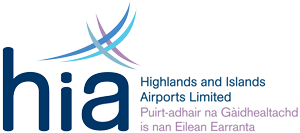Background
Wick John O’Groats Airport in Caithness is the UK mainland’s most northerly airport. Managed by Highlands and Islands Airports Ltd (HIAL), pre-COVID 19, it hosted regular scheduled flights to Aberdeen and Edinburgh and is currently regularly used by helicopters servicing the local offshore industry (oil and renewable sectors) alongside light aircraft transiting between Europe, North America and Iceland.
In recent years, significant upgrades to the main runway have been made to accommodate larger aircraft, and as part of ongoing water drainage and treatment improvements at the airport, HIAL are now funding investigative research with a view to minimising the environmental impact of their operations on local surface water quality.
MRes project description
This project will holistically consider the potential drivers underlying surface water quality/hydrochemistry at the Wick Airport site. The project will utilise a mix of desk-based assessment (i.e., of historic data/information), regular field site monitoring and laboratory-based water quality chemical analyses.
At present, one key consideration at the airport is thought to be the application of runway de-icer (as potassium-formate) during cold periods, which has the potential to adversely affect surface water quality and receiving water bodies around the airport. However, other (as yet unquantified) drivers are also thought to be at play, given that reductions in water quality have also been observed (in the past) outside periods when de-icer is being used. Through access to long-term historic information, and in obtaining new detailed water quality data during the MRes, the project will seek to improve understanding regarding water quality variations at Wick Airport temporally and spatially.
The project will benefit significantly from close on-going interaction and engagement with HIAL (the project funder), alongside other key stakeholders such as SEPA (Scottish Environmental Protection Agency). The student will gain a wide range of experience in environmental monitoring, environmental chemistry and the analysis and presentation of large datasets. While the core project regards water quality, there will be scope to expand this depending on the interests of the student.
Requirements
Students with, or expecting to gain, at least an Upper Second-Class Honours degree, or equivalent, are invited to apply. We would welcome applications from students with backgrounds in Environmental Science, Hydrochemistry, Environmental Chemistry, Analytical Chemistry or similar subjects that provide relevant skills, knowledge or experience.
Facilities and Funding
A stipend of £15,609 for 1 year and full UK tuition fees are available. Laboratory, office facilities and support will be provided at the Environmental Research Institute, North Highland College UHI, Castle St, Thurso, KW14 7JD. Non-UK students will be liable for extra tuition costs.
Masters by Research programme
This MRes in Environmental Science is a full-time programme undertaken over 12 months, see: https://www.uhi.ac.uk/en/research-enterprise/grad-school/research-degrees/mres/
Director of Studies: Dr Mark Taggart
Duration: October 2021 – September 2022
To apply
Please send one pdf, with the following information:
- 500-750 words explaining your reasons for interest in studying for the MRes and your relevant experience.
- A full detailed CV – including contact details, phone and email address.
- Two Academic Referees – including contact details.
To the following email address: Mark.Taggart@uhi.ac.uk
Closing date for applications: 11th August 2021. Interviews to be held week commencing 16th August 2021.

